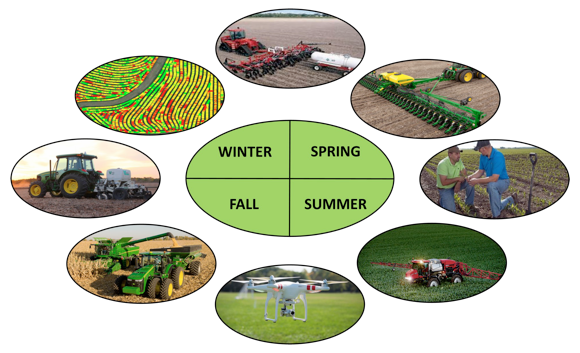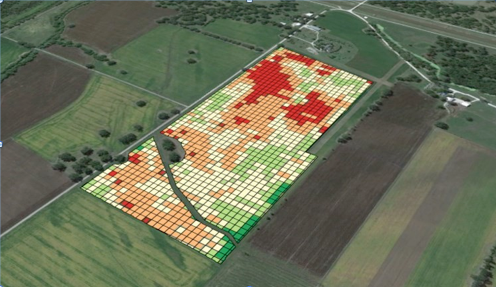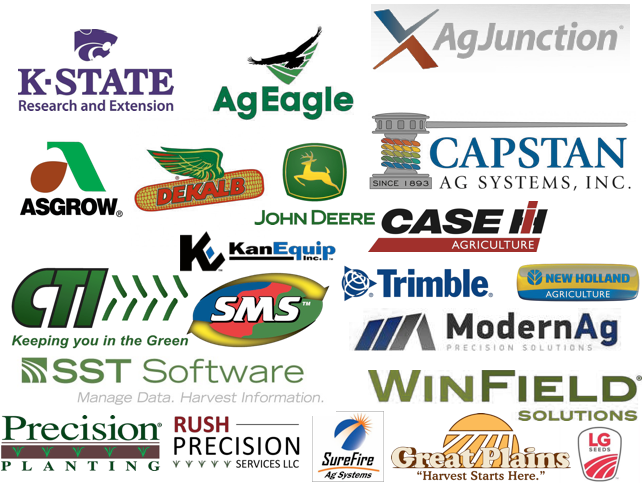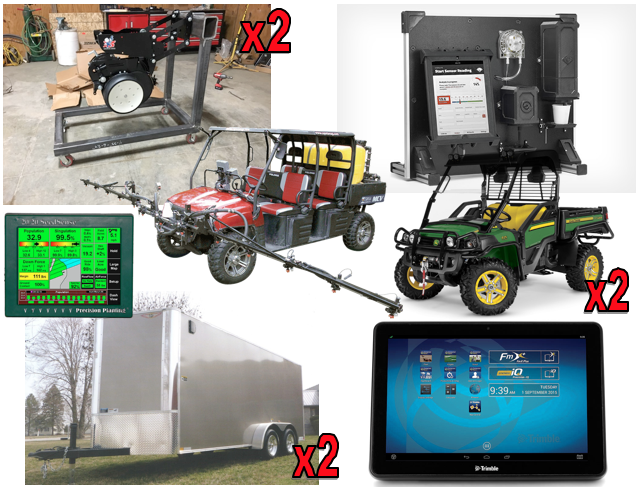O’Farrell Places 8th at NJCAA National Meet
Alexis O’Farrell (Appleton City, Missouri) placed eighth at the NJCAA Division I national... Read More
TITLE III GRANT FUNDS BRING PRECISION AGRICULTURE COURSES TO HCC - IN WAMEGO & BAILEYVILLE - FALL, 2016
Highland Community College’s recent Title III grant entitled Tapping Rural Potential through Expanded Access is well on its way to success. The grant, awarded to the College in October, 2013, allows HCC to expand access to high demand programs and support services in order to connect students with growing area employment opportunities while increasing enrollment revenue. The grant focuses on three activities:
Precision Agriculture encompasses all of the latest technology present on the modern day farm. This program does not differ from that of traditional instruction in agricultural methodologies because we will teach the student the importance of the same practices of husbandry, conservation, and efficiency. The difference lies within the means. A successful graduate in a Highland Precision Agriculture degree or certificate program will be competent in the subjects of agronomy, economics, and engineering—three of the core fundamentals of today’s precision agriculturalist with the knowledge of how technology can add to the efficiency of the modern day farming operation or agribusiness.

The cycle of a “precision” agriculturist is no different from that of the “traditional” agriculturist. The farmer still fertilizes, plants, sprays, and harvests crops. The difference, again, lies in the decision making process. In a manner very similar to the research conducted by a stock broker on a potential company to invest in, the modern farmer grows not just crops, but data as well. Rather than the dataset including information about a company’s profitability or performance, the agriculture dataset includes such items as harvest yield and bio- physical data. The enormous dataset generated known in the industry as “Big Data” - a newly adopted seg- ment found within the current environment of Precision Agriculture. On any given year, a farmer can harvest as much as 1 GB of data on one 80-acre farm! This dataset, over the course of many years and many acres, can grow many times over and can become increasingly difficult to sort through to find answers to questions over time. That is where Precision Agriculture comes in. The millions of observations are collected, organized, and then strategically layered to form a usable resource which can be used to make future decisions.
What is new in Precision Agriculture

Today is a new chapter in the world of agri- culture. As noted, “Big Data” is quickly becoming the latest buzz word in this industry. The second largest growing segment within Precision Agriculture is that of UAVs—or Unmanned Aerial Vehicles—and the role that they will play on the modern farm. Experts are currently trying to deter- mine its place in the toolbox of the farm of the future and the true value of the data which it has the ability to collect. Ask just about any person about the role of the UAV in agriculture, and you will receive a completely different answer from each, depending on how they use it. In the picture above, the image was collected via a UAV (or drone) and an algorithm was applied to the observations to create a grid for the application of fertilizer based upon the perceived need of the crop being grown. So far, the industry has only been comfortable with making aerial decisions for growing corn only due to the color palette of the crop. Work is being conducted extensively on the tools needed to make this more than a scouting tool which enables an agronomist to cover hundreds of thousands of acres in one swoop. The subjects of data ownership and aerial imagery will have the greatest impact on how the industry evolves as it grows and if it is adapted.
Curriculum and Instruction - Program Layout
The Precision Agriculture curriculum at Highland is made up of three blocks—A one semester certificate option, a one-year certificate option, and a two-year Associate of Applied Science degree option.
The overall layout of the program is made up as follows. Please be advised that this is not currently approved by our Curriculum and Instruction committee or Kansas Board of Regents. Approval will need to be received prior to us marketing the official curriculum, but this is the structure we are in the process of working toward.

Wamego Center Building B Renovation for PrecisionAgriculture
As you are aware, we are currently in the process of determining the renovations to be completed for the new Precision Agriculture classroom space. The most up to date proposal now divides the space encompass- ing the scope of the project into 4 separate rooms. The room on the far north of the plan is to become the flagship room for the program. We will have a countertop space constructed to mirror most agribusinesses that will be used for the development of public speaking and communication skills. Among ag retailers, this is the most talked about room of the project. The second space will be a fully-functioning agricultural data center, complete with an IT infrastructure capable of handling the immense data stream expected to come from this program. The third and fourth spaces are projected to become two separate classrooms. Both will have Smart functionality and will hold 20 and 35 students, respectively, when viewing the plans north to south. The new layout will provide ample room to hold a capacity of 80 students total, or host two cohorts of 20 students with two classroom/meeting spaces for professional gatherings or non-Precision Agriculture courses.
Growing List of Highland AgribusinessPartnerships
We are excited to be gaining tremendous support from area-wide businesses who are sponsoring various elements within our new program. This is a small list of the growing number of businesses who have offered us the use of resources ranging from equipment with special pricing to guest speakers and student internships.

Equipment Purchases and Orders
Through the use of Title III and Perkins grant funds, we have over $90,000 in equipment on order with area-wide businesses. The incredible scope of the offerings of our local dealerships and professionals are allowing us to keep all of the grant dollars here in NE Kansas. Below is a graphical representation of some of the projects we are currently working on and some of the purchases we have been able to make already.

Where are we at in the process?
So far we have gained approval from the Highland Curriculum & Instruction committee enabling us the ability to offer a Certificate A, Certificate B, and Associate of Applied Science degree. The next step in that process will be to do a second revision to the course titles and layout for the program. We are currently recruiting at local high schools and are setting up meetings with superintendents and principals to discuss their involve- ment in providing this program to their students in lieu of electives. There are a number of meetings set up with area businesses as well in the coming weeks to discuss partnerships, purchases, and personnel as well as promotional opportunities. In the next few months, we will have our Building B remodel complete in Wamego, intend to have our first two cohorts signed up for classes in Baileyville and Wamego, and will have two 18-foot trailers fully outfitted to offer students a one-of-a-kind experience with the ability to interact at multiple locations. We are very excited to see it all coming together. Thank you so much for your support!
TITLE III GRANT FUNDS BRING COLLEGE COURSES TO RURAL AREAS
.jpg) |
.jpg) |
.jpg) |
|
Highland Community College’s recent Title III grant entitled Tapping Rural Potential through Expanded Access is well on its way to success. The grant, awarded to the College in October, 2013, allows HCC to expand access to high demand programs and support services in order to connect students with growing area employment opportunities while increasing enrollment revenue. The grant focuses on three activities:
1. Create a Western Technical Center to expand access to Allied Health courses, general education courses, and technical and vocational courses.
2. Create a Manufacturing Technology Certificate of Completion pathway.
3. Develop a new, high demand, hybrid Precision Agriculture program with an on-site Precision Ag lab and a mobile lab. Courses will be offered online and on-site.
4. Upgrade Interactive Distance Learning equipment on the main campus and five regional sites to further expand access to programs across the entire service area.
Total Five-Year Budget awarded: $2,242,279
As part of the grant expense, the Title III Grant Director was hired. The director then hired a regional site director, a student services representative and an administrative assistant. All positions were established with grant funding.
During year one, 2013-2014, HCC purchased and renovated B & B High School near Seneca, Kansas to establish the Western Center. The Western Center opened in June, 2014, offering general education courses, Allied Health courses, Diesel Technology, Industrial Welding and Medical Office Assistant programs. A Student Services hub was established to help area students with registration, advising, orientation, and financial aid.
During year two, 2014-2015, new equipment and supplies was purchased for the Allied Health program. As indicated in the grant, two Allied Health certificates: C.N.A. and C.M.A., are now offered at the Western Center. Over 100 students have taken advantage of these courses since the inception of the grant.
The new Manufacturing Technology certificate of completion pathway was approved and five new courses were added to the curriculum. Those courses are available in fall, 2015 at both the Western Center and the Technical Center in Atchison. Also the IDL room on the main campus was upgraded to offer more distance learning classes for the students on campus.
Year three begins October, 2015. Many new projects are in store for the College.
TITLE III GRANT FUNDS BRING MANUFACTURING COURSES TO HCC-FALL 2015
If you have considered a career in manufacturing industry, you need to enroll in the Manufacturing Technology Certificate of Completion pathway offered in the fall, 2015. HCC is offering OSHA 10, Blueprint Reading, Precision Measurement, Workplace Skills and Technical Math.
What do Manufacturing Technicians do?
Manufacturing technicians help industrial companies implement designs to effectively use personnel, materials, and machines in factories, stores, healthcare organizations, repair shops, and offices. They prepare machinery and equipment layouts, plan workflows, conduct statistical production studies and analyze production costs.
Work Environment
Manufacturing technicians work in various industries and businesses to coordinate activities that ensure the quality of final products or services. Most work full time.
How to Become a Manufacturing Technician?
Manufacturing Technicians typically need an associate’s degree or post-secondary certificate. The courses in the Manufacturing Technology pathway can lead to additional training in Industrial Welding or Engineer Graphics and Technology programs at the Western Center in Baileyville or HCC Technical Center in Atchison.
Pay
The median hourly pay for manufacturing technicians with an associate degree is $24.51 per hour.
Job Outlook
The growing emphasis on cost control through increasing efficiency will keep up demand for manufacturing technician services in most industries, including nonprofits.
Similar Occupations
Some possible careers are: Cost Estimators, Health and Safety Engineers, Industrial Engineers, Logisticians and Quality Control Inspectors.
*Occupational Outlook Handbook: US Bureau of Labor
Alexis O’Farrell (Appleton City, Missouri) placed eighth at the NJCAA Division I national... Read More
The Highland Community College Board of Trustees approved a new tuition and fee rate of $65 per... Read More